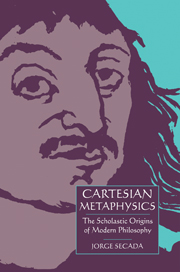Book contents
- Frontmatter
- Contents
- Preface
- Abbreviations
- Prologue
- Part I The unity of Cartesian metaphysics
- Part II Ideas and the road from essence to existence
- 4 Ideas and the world in the mind
- 5 My wax, my intellect and I
- 6 Essentialism and the existence of God
- Part III Cartesian substances
- Epilogue
- Notes
- References
- Index
4 - Ideas and the world in the mind
Published online by Cambridge University Press: 22 September 2009
- Frontmatter
- Contents
- Preface
- Abbreviations
- Prologue
- Part I The unity of Cartesian metaphysics
- Part II Ideas and the road from essence to existence
- 4 Ideas and the world in the mind
- 5 My wax, my intellect and I
- 6 Essentialism and the existence of God
- Part III Cartesian substances
- Epilogue
- Notes
- References
- Index
Summary
Cartesian ideas
What are the causes of ideas? How is the mind directed to its objects? We have encountered these questions in the context of the discussion of the scope and nature of human knowledge in the Rules. In this chapter I will examine the answers Descartes developed over the decade following the abandonment of that early treatise. They are contained in The World, Treatise on Man, and Optics, writings which he composed shortly after leaving Paris for Holland, and in the fuller expositions of his essentialist metaphysics, the Discourse and Meditations. There were to be no significant changes in the works of the last decade of his life, the Principles and The Passions, though he would then address some of the problems that objectors had found in the earlier books. Discussion of Descartes's answers to our two questions about the causality and the intentionality of ideas will naturally lead to an examination of his views on the structure of mental acts, and his doctrine that such acts suppose the existence within the mind of certain inner things which are the immediate objects of consciousness. As argued earlier, this doctrine is at the core of Descartes's essentialist reaction to the existentialist empiricism of the School.
In his mature work Descartes distinguished two aspects of an idea which stand in need of causal explanation. Cartesian ideas are acts, modes, or properties of a thinking substance. Like any other actual properties, actual ideas have causes.
- Type
- Chapter
- Information
- Cartesian MetaphysicsThe Scholastic Origins of Modern Philosophy, pp. 77 - 114Publisher: Cambridge University PressPrint publication year: 2000



